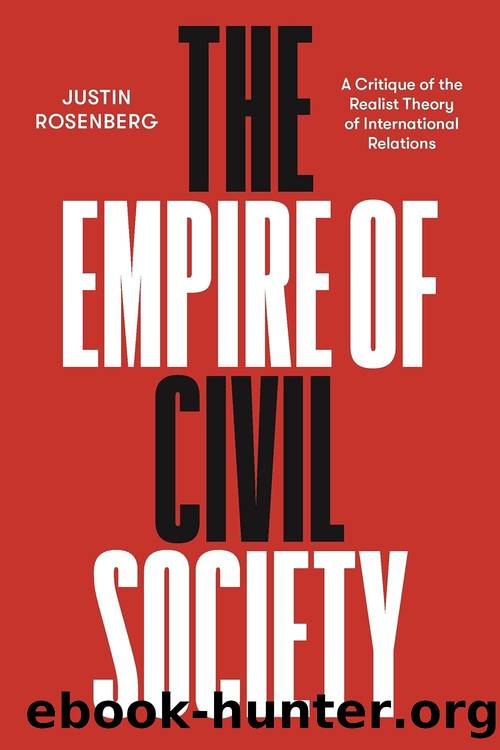The Empire of Civil Society: A Critique of the Realist Theory of International Relations by Justin Rosenberg

Author:Justin Rosenberg [Rosenberg, Justin]
Language: eng
Format: epub
Tags: Political Science, International Relations, General, Geopolitics, Public Policy, Social Policy
ISBN: 9781804295977
Google: W4r3EAAAQBAJ
Publisher: Verso Books
Published: 2024-11-25T23:00:00+00:00
The Structural Basis of Civil Society
Let us begin, as Marx recommended, with the relationship between the direct producer and the owner of the conditions of production. In capitalist societies the direct producers are no longer in possession of their own means of subsistence, and what binds them to the processes of surplus extraction is no longer political command, but rather the requirement to sell their labour in order to gain this subsistence. This necessity supports the distinctive capitalist relations of surplus extraction themselves: a legally sanctioned contract of exchange between formal equals in which the labourer accepts authoritative subordination in the private realm of production and forgoes any rights over the product in exchange for an agreed wage payment.
There is a very striking contrast here. In precapitalist societies the apparatus of public rule was implicated directly in the process of surplus extraction and the producers were therefore, as we would regard it, politically unfree. This does not mean that all precapitalist societies were prison camps. The non-economic means used to extract the surplus varied, as Marx observed, âfrom serfdom with enforced labour to a mere tributary relationshipâ,1 and an apparatus of domination might bear down more or less heavily on the peasant majority. It does mean, however, that formal political inequality was basic to social reproduction. Not so with capitalism. Under capitalism the formal subordination in production which accomplishes the extraction of the surplus is not exercised through the state. Formal political inequality is therefore not inscribed in the relations of production. This does not mean that all capitalist societies are havens of human rights. Once again, the historical variation is considerable, and only a tiny number of capitalist societies have been able to sustain durable political democracies.2 But if any have been able to do so, and to institutionalize a formal political equality among the citizenry, this reflects the fact that under capitalist relations of production the direct extraction of a surplus is accomplished through ânon-politicalâ relations associated with new forms of social power.
What, then, are these new forms of social power? This is the riddle that Marx sets himself to answer in Volume I of Capital. We call them âmarket forcesâ and the rule of law. But what, after all, is the market? In the first place it is, as Sayer puts it, not just a thing we inhabit as individuals, but simultaneously a way we collectively are as a society.3 It is a historically specific set of social relations between persons which effects the reproduction of the social order in a determinate form. And what makes the capitalist market different from all other markets in history is the generalized commodification of labour-power. Where this occurs, the market ceases to be simply a set of voluntary exchange relations which circulate only a small fraction of the social surplus. It becomes a compulsory association, which subordinates all its members to the impersonal rule of value. To uncover exactly what this new form of rule comprises, and how it operates,
Download
This site does not store any files on its server. We only index and link to content provided by other sites. Please contact the content providers to delete copyright contents if any and email us, we'll remove relevant links or contents immediately.
The Secret History by Donna Tartt(19058)
The Social Justice Warrior Handbook by Lisa De Pasquale(12187)
Thirteen Reasons Why by Jay Asher(8894)
This Is How You Lose Her by Junot Diaz(6877)
Weapons of Math Destruction by Cathy O'Neil(6267)
Zero to One by Peter Thiel(5789)
Beartown by Fredrik Backman(5737)
The Myth of the Strong Leader by Archie Brown(5500)
The Fire Next Time by James Baldwin(5432)
How Democracies Die by Steven Levitsky & Daniel Ziblatt(5216)
Promise Me, Dad by Joe Biden(5144)
Stone's Rules by Roger Stone(5081)
A Higher Loyalty: Truth, Lies, and Leadership by James Comey(4954)
100 Deadly Skills by Clint Emerson(4921)
Rise and Kill First by Ronen Bergman(4780)
Secrecy World by Jake Bernstein(4742)
The David Icke Guide to the Global Conspiracy (and how to end it) by David Icke(4709)
The Farm by Tom Rob Smith(4502)
The Doomsday Machine by Daniel Ellsberg(4485)
